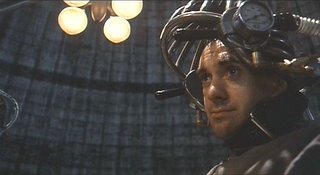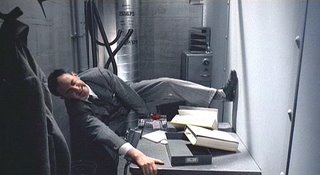Well, here's my first official post in a bona-fide blog! On "Blogger" no less. My previous attempts at blogging were in the younger and slightly more foolish days of, well, last year. I took a lovely trip to France to travel (with a side of study mixed in) and started up an
MSN Space thing that basically turned into a place to dump pictures.
So I think it's about time now to graduate to a real blog.
To start with, the title of my blog comes from my favourite author in the world: Neil Gaiman (and if you already got the reference then you're my new favourite person in the world). His latest full-scale novel is called
Anansi Boys, and it tells a classic story of two brothers who are complete opposites and end up ruining each others' lives and then having to fix it all up again. However, they happen to be the offspring of Anansi, the mythological African
spider god. Okay, it's definitely a twist on a classic story.
Gaiman has used Anansi as a character in two novels now (
Anansi Boys, and the darker previous work
American Gods) and he has created his own intriguing take on the mythical trickster god. To the human characters of Gaiman's world, Anansi looks like a charming, old-fashioned black man from down south: permantly smiling, always saying the right things (especially to the ladies), and forever topped off with a spotless green fedora. Unfortunately for the protagonist of
Anansi Boys, Fat Charlie Nancy, even though he's the son of a spider god he seems to have gotten none of his Dad's otherworldly charm. In fact, it all seems to have gone to his much cooler long-lost brother, Spider. And that's not even the start of Fat Charlie's problems. Did I mention that Fat Charlie isn't even fat at all? Fat Charlie's search for his exciting "spider side" that lurks inside him is written in a consistently funny tone that makes for a great read.
But Anansi to Gaiman is more than just a fun character: he exists as a tribute to stories. Gaiman is a student of mythology, and his works include a dizzying array of references to mythological characters from all parts of the world (his
Sandman graphic novels as well as
American Gods touch on Norse, Greek, Slavic, African, and Asian mythologies) and the beauty of it all is that if you read Gaiman's work the first time, you might not get all the references. Where's the "beauty" part of that you might ask? Well, it's so well-written and interesting, you'll want to look things up, learn more, read more, absorb more stories just like Gaiman has done over his lifetime.
According to the African mythology, Anansi used his cunning and trickery to become the Lord of All Stories. His stories live on in places all over the globe, from Anancy stories in Jamaica to the Brer Rabbit tales in the American South. Gaiman sees this as a commentary on humanity in general: we want to believe that the little guy, using brains instead of brawn, tricking and charming his way into what he wants, will prevail. Odysseus wasn't the strongest or the bravest soul to fight in the Trojan War, but he was probably the most cunning. His Odyssey to return home through nearly insurmountable obstacles lives on to this day because we love to see how he will think his way out of the next challenge. It's no coincidence that Anansi is not the only Lord of Stories in Gaiman's work; Dream (or Morpheus or, well, a million other names) in Gaiman's
Sandman series is also known by this title. He gives inspiration in one memorable case to a young playwright named Will Shakespeare who apparently can't string two words together, in exchange for two plays about the power of dreams. In Gaiman's mythology these become
A Midsummer Night's Dream and
The Tempest, notably the only two of Shakespeare's plays not based on historical facts or pre-existing works.
A love of stories is a recurring theme in Gaiman's work, but also in everyday life. Who doesn't love a good story, be it the latest summer blockbuster, an arthouse flick, a good book, a newspaper article, or something that happened to a friend of a friend a few weekends ago that everyone in town is talking about. People love a good story. We're all the children of Anansi in that way. I'll be sharing my love of good stories with thoughts and observations about the latest things that I've been seeing, reading, hearing (okay, tasting, touching, and smelling don't really apply here). Whatever interests me, even for a sweet, fleeting moment, will be here. On we go...






